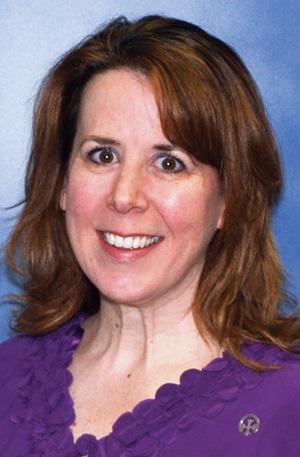
By Barb Arland-Fye
Whether you’re focused on respect life or social justice issues, your participation is requested at the 18th Annual Iowa Institute for Social Action at St. Patrick Church in Iowa City. In fact, the focus of the Oct. 8 conference is bridging the gap that sometimes exists between respect life and social justice ministries.
“We have different groups, different charisms, but we are still one body and what moves us is not our individual issues, but rather love of God and love of neighbor,” says conference presenter Helene Paharik, MA. “Both groups realize the need for charity and justice. I use the analogy of a boat — if you have only one oar, you’re going to go around in circles. You need two oars to move the boat. We’ll get closer to God and one another if the oars are coordinated and we see the bigger picture — respect for life and the God-given dignity of the human person” — says Paharik, who directs the Pittsburgh Diocese’s Department of Human Dignity Secretariat for Evangelization and Social Concerns.
Through a PowerPoint presentation, song and prayer, Catholic Social Doctrine will be illuminated with particular emphasis on the “Compendium of the Social Doctrine of the Church,” the papal encyclicals “Caritas in Veritate” and “Deus Caritas Est” as well as statements by the U.S. Catholic bishops.
“Let’s put aside our identities as Republican or Democrat or Tea Party or pro-lifer or social justice person and simply put on our identity as a member of the body of Christ. We are all in this together,” said Tom Chapman, executive director of the Iowa Catholic Conference, which is co-sponsoring the conference with the state’s Catholic dioceses.
Paharik hopes to help participants see how the God-given dignity of the human person serves as the axis around which all social doctrine of Catholic teaching revolves. “What moves that axis is love, love of God. As a Church, when we understand that most deeply, collectively, our actions are more in tune with one another.” The goal of her talk, she said, is “help all of us to re-commit and re-consecrate ourselves to a deeper sense of collaboration in this endeavor. As practical examples, that might mean being patient with one another and listening to each other’s perspective.
“The world welcomes unity in the Church. But if the world sees Catholics arguing and bickering about what we’re going to do, who’s going to want to join our efforts to promote life, peace and justice?” So another image in Paharik’s presentation will be the Trinity, the ultimate manifestation of unity. “God is relationship, three people who love each other fully and completely.”
Paharik is convinced that it’s a great time, a critical time, to be a Catholic in a world which has lost its story.
“The Church helps us remember that story. It’s in the Church that we’re reminded who we are and how we ought to be together.” In the world, in the culture, is where the story plays out. “It’s loving and sharing and engaging in conversation and witnessing by the very nature we live our lives. As leaders in life and justice, I think we have to help people understand the truth. Where I learned this best was in my work in the Holy Land,” she said.
In 2005, Paharik and her husband, Jim, a sociology professor, took their four then-teenage children on pilgrimage to the Holy Land which led to a call to work and pray on behalf of Christians there. “We worked with the Benedictine monks of Dormition Abbey on Mount Zion in Jerusalem to envision Beit Benedict Peace Academy. I took a leave from full-time active diocesan ministry to volunteer as director of development for Beit Benedict from 2007-2010. My husband and I did needs assessments, developed program models and met with local peace builders and traveled back and forth to learn and serve the mission of Dormition Abbey to provide space for encounters that foster reverence and reconciliation.”
She marveled at the way Christians living under occupation in the West Bank witnessed to the faith. They practice “W’am,” an Arabic word meaning “cordial relations.” Their witness is a reminder of the four “R’s” of the Catholic faith: reverence (for the human person), reconciliation, reason (ours is a faith formed by reason), and resurrection (the hope that every Good Friday is followed by Easter).
Christians in Bethlehem, 80 percent of whose inhabitants are Muslim, are working on domestic violence intervention, forming men’s groups that deal with anger issues, striving to strengthen families and creating centers for mediation.
In the United States, political and cultural polarization has led to such demarcations as red state Republicans and blue state Democrats. Paharik says Catholics should be thinking of themselves as “yellow,” the color associated with the Catholic faith. “We’re Catholic first.”
What: 18th Annual Iowa Institute for Social Action
When: Saturday, Oct. 8, 8 a.m. to 4 p.m. Registration begins at 8 a.m. Mass offered at 4:30 p.m.
Where: St. Patrick Church, 4330 St. Patrick Drive, Iowa City
Theme: Respect for Life and Dignity of the Human Person: Basis for All Social Concerns
Cost: $25 general admission, $10 for students. Includes registration, materials, continental breakfast and lunch
Who’s invited: Deacons, lay leaders, parish council members, priests, Sisters, Respect Life leaders, seminarians, and students
Sponsors: Catholic dioceses of Iowa and Iowa Catholic Conference
Registration: Go to www.iowasocialaction.org for a downloadable brochure and to register. Or mail registration and payment to: Iowa Institute for Social Action, Iowa Catholic Conference, 530 42nd St., Des Moines, Iowa, 50312. Or call (515) 243-6256.








